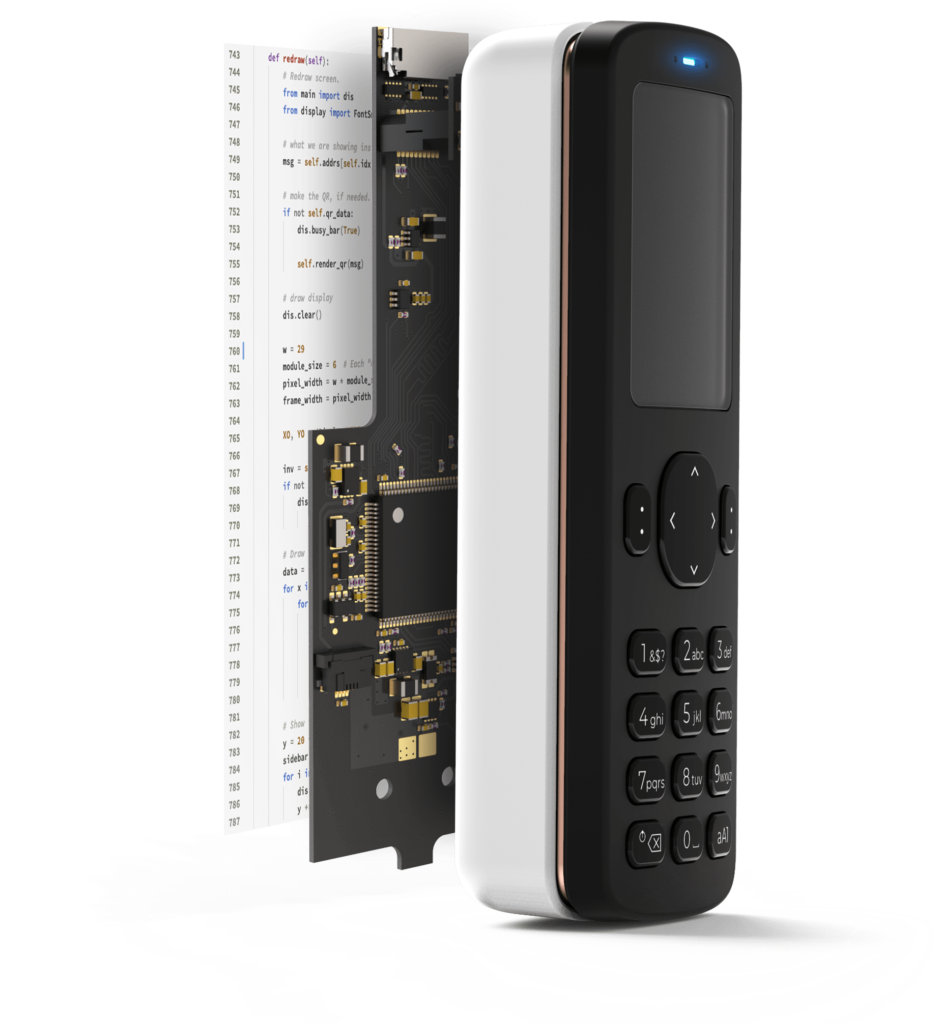
Today we’re proud to announce that Bolt is leading the pre-seed round for Foundation Devices and will be backers on their mission to lay the foundation for a better, decentralized Internet. I’ll be honored to serve on the board and wanted to share our thoughts behind the investment.
Foundation is designing devices and integrated services that provide a best-in-class user experience for the rapidly evolving crypto user base without compromising the open, decentralized values inspiring this computing revolution.
(If you’re in Miami for the Bitcoin conference this week, definitely give a shout to the Bolt and Foundation team in person. Ahhh…real human interaction)

Crypto has a UX problem
We’re at a pivotal moment in crypto adoption and a major paradigm shift in computing architecture. The user base is exploding and pulling more mainstream while successfully transmitting much of the philosophical ethos that makes the movement especially powerful.
Use cases are evolving faster than ever…coins to layer 2 protocols to defi to NFTs to DAOs to dapps…hold on to your butts. If you blink, you’ll miss what started as a toy digital currency exploding into identity-defining games and communal supercomputers and non-geographic anarchosocialist city-states.
At Bolt, we’re optimistic about the applications for decentralized computing, but unlocking real-world value requires being realistic about the challenges ahead. First and foremost is crypto’s user experience problem. Let’s be honest…it’s still hard to get started and hard to feel safe, much less to have fun or be useful. From fiat on-ramps to exchanges, we’re making improvements, but often at the expense of decentralization itself.
It’s imperative to improve the user experience for the rapidly evolving user base without sacrificing the trustless, decentralized nature that makes the whole endeavor worthwhile in the first place.
It’s imperative to improve the user experience for the rapidly evolving user base without sacrificing the trustless, decentralized nature that makes the whole endeavor worthwhile in the first place. Instead of falling back to centralized walled gardens to solve usability issues, we must reach all the way down to the underlying hardware and software to redesign the user experience layer by layer on a sturdy foundation.

Sovereignty made easy
So what is Foundation Devices building? Simply put, Foundation designs easy-to-use devices, software, and services for what they call sovereign computing.
But before we talk more about what, let’s talk about why. Foundation is a company that speaks about their mission and values first:
OUR MISSION
Foundation Devices strives to empower humankind – to make Bitcoin and decentralized tech accessible to each and every individual in order to build a new era of sovereignty, ownership, and privacy. Our products are the foundation of a better, decentralized Internet.
OUR VALUES
- Foundation offers best-in-class security and privacy via openness. No walled gardens; no closed source engineering. We are the antithesis of existing tech companies.
- Foundation products are beautiful, intuitive, and approachable. Bitcoin and decentralized tech already have a steep learning curve; our products do not.
- Foundation gives sovereignty to individuals and businesses. We empower you to take ownership and control of your money and your data.
- Foundation products reflect our optimism about the future. We are building a better Internet based on a better form of money. Our products feel positive, aspirational, and a bit sci-fi.
Foundation’s first product is called Passport, a next-gen hardware wallet with a transformative user experience that doesn’t compromise on security.

Passport is:
- Easy-to-use and mobile-first: Passport’s key signing is managed by scanning QR codes. It’s truly airgapped and easy to integrate directly with mobile apps.
- Stress-free: The primary barrier for self-custody is stress about seed phrase management. Passport’s encrypted backups eliminate the need for seed phrase management for most users.
- Open source: hardware and software
- Made in the USA: PCB assembly, programming, and final assembly are all done with a trusted and auditable domestic supply chain

Passport is shipping today and the first user impressions have been overwhelmingly positive.
Zach and team are just getting started. This is an MVP crypto computer. Stay tuned for companion apps and a whole ecosystem of new devices.
Not your computer, not your keys…
Millions of this class of device (albeit with major usability and security tradeoffs) are sold every year as users accumulate more personal wealth in crypto. We call these devices “hardware wallets” today, but that’s a bit of a misnomer…these are really key signing platforms. Today keys represent your money, tomorrow they’ll represent your data and identity. As use cases expand, managing your own keys will become increasingly important and poor UX or expecting financial institutions to manage custody will become increasingly unacceptable. We’re bullish on self-custody and bullish on easy-to-use key signing platforms.
Today keys represent your money, tomorrow they’ll represent your data and identity.
But what about Metamask and Rainbow and Casa and BlueWallet and [insert favorite software wallet here]?
Yes! There is a lot your phone and an app can do today, and that’s great. We believe the industry is also on the cusp of a software wallet diaspora…all offering different services, UIs, and interoperability. They’ll be blockchain-dependent and fundamentally always have a long tail of functionality to keep up with the new hotness.
As abundance-mindset maximalists, Foundation’s strategy is to be hyper-integrated with the ecosystem of wallets and services to appeal to the echelon of users who want that extra layer of autonomy and security. We like this mindset and horizontal approach.
This segment of users are thought leaders and painfully aware of issues from centralization: Google Play repeatedly banned Metamask. Coinbase had to remove its dapp store + browser because of Apple. AWS can pull the plug on you. Robinhood can block trading for specific assets. Apple secure enclaves quickly get cracked again and again (and when vulnerabilities are discovered, they’re usually exploited long before they’re published). This high-value, influential user is not satisfied with living their crypto life on top of closed source, centralized platforms. If products and services like Foundation’s can balance UX and security, we think this ethos will increasingly influence the mainstream user as well.

New business models for open source
It can’t be overstated how transformative a trustless, decentralized architecture is both technically and from a business perspective. This architecture demands open and auditable designs and historically we’ve seen this security model beat security-through-obscurity time and time again (see Linux).
There’s a real opportunity for disruptive newcomers like Foundation who embrace open source and monetize on services, ecosystems, and ongoing exchange of value. The BigCo incumbents are structurally shackled to legacy business models making points of margin from the one-time-sale of widgets and their historic security approaches. They’re slowly pivoting into services models, but we expect their walled gardens to force them to be even *more* restrictive to maintain growth over time.

Forward the Foundation
We’re proud investors and privileged to collaborate with Zach and the excellent team at Foundation. We believe there’s an opportunity to build an important, impactful company by artfully balancing user experience, security, and functionality as we all blaze the trail into the decentralized future.
Bolt invests at the intersection of the digital and physical world.
